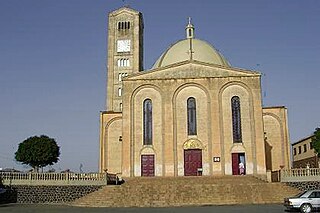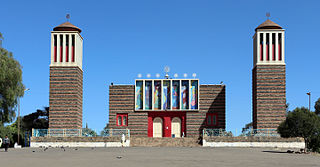
The Eritrean Catholic Church or Eritrean Eastern Catholic Church is a sui iuris (autonomous) Eastern Catholic church based in Eritrea. As a particular church of the Catholic Church, it is in full communion with the Holy See. It was established in 2015 when its territory was separated from the Ethiopian Catholic Church. The church is organized under a metropolitan bishop who exercises oversight of a number of suffragan dioceses. In its liturgical services, it uses the Alexandrian Rite in the Ge'ez language.

The Ethiopian Catholic Church or Ethiopian Eastern Catholic Church is a sui iuris (autonomous) Eastern Catholic church that is based in Ethiopia. As a particular church of the Catholic Church, it is in full communion with the Holy See. Established in 1930, the church is organised under a metropolitan bishop who exercises oversight of a number suffragan dioceses. In its liturgical services, it uses the Alexandrian Rite in the Ge'ez language.
The Orthodox Church in Italy, also called Chiesa Vecchio-Cattolica in Italia or Old Catholic Church in Italy, is an Old Catholic denomination.

Eastern Orthodoxy in Italy refers to adherents, religious communities, institutions and organizations of Eastern Orthodox Christianity in Italy. In 2014, there were 14 distinctive Eastern Orthodox jurisdictions on the territory of Italy, some of them belonging to canonical Eastern Orthodox churches, while others are classified as independent (noncanonical). First session of the Council of Canonical Orthodox Bishops in Italy was held in 2009.
Antonio De Rosso was an Italian priest and Christian leader who successively belonged to various Christian denominations. After initial priestly service in the Catholic Church, he changed several affiliations. Eventually, he became Eastern Orthodox bishop (1986), founder of the Orthodox Church in Italy (1991), Metropolitan of Ravenna and Italy (1997-2009), and Archbishop of L'Aquila (2009).

Religion in Italy has been historically characterised by the dominance of the Catholic Church since the East–West Schism, but, over the years, due to immigration, the influx of Muslims, Orthodox Christians, Protestants, Buddhists and Hindus, as well as proselytism, religious pluralism has increased. Italy also features a pre-Christian Jewish community and one of the largest shares of Jehovah's Witnesses in the world.

Christianity in Italy has been historically characterised by the dominance of the Catholic Church since the East–West Schism. However, the country is also home to significant Christian minorities, especially Orthodox Christians, Protestants and Jehovah's Witnesses.

The Waldensian Evangelical Church is a Protestant denomination active in Italy and Switzerland that was independent until it united with the Methodist Evangelical Church in Italy in the Union of Methodist and Waldensian Churches. Founded in the 12th century by Peter Waldo as a proto-Protestant group, since the 16th century Reformation it has adopted Calvinist theology and blended into the wider Calvinist tradition. It is one of several Protestant denominations with pre-Reformation roots, and is appraised by various denominations of Protestantism as its major successor.
The Methodist Evangelical Church in Italy, known also as Italian Methodist Church, is a Protestant church in the Methodist tradition active in Italy that is in full communion with the historical Waldensian Evangelical Church in the Union of Methodist and Waldensian Churches. It part of the World Methodist Council.

Eritrea as a country and the Eritrean community are multi-religious. Eritrea has two dominant religions, Christianity and Islam.

Charitable institutions attached to churches in Rome were founded right through the medieval period and included hospitals, hostels, and others providing assistance to pilgrims to Rome from a certain "nation", which thus became these nations' national churches in Rome. These institutions were generally organized as confraternities and funded through charity and legacies from rich benefactors belonging to that "nation". Often, they were also connected to national scholæ, where the clergymen of that nation were trained. The churches and their riches were a sign of the importance of their nation and of the prelates that supported them. Up to 1870 and Italian unification, these national churches also included churches of the Italian states.

Dimitrios (Dimitri) Salachas was the apostolic exarch of the Greek Byzantine Catholic Church.

The Oriental Orthodox Churches are Eastern Christian churches adhering to Miaphysite Christology, with approximately 50 million members worldwide. The Oriental Orthodox Churches adhere to the Nicene Christian tradition. Oriental Orthodoxy is one of the oldest branches in Christianity.

Protestantism in Italy comprises a minority of the country's religious population.

In the Schism of Montaner between 1967 and 1969, almost all residents of the Italian village of Montaner renounced Roman Catholicism and embraced Eastern Orthodoxy. This was due to a disagreement with the bishop of Vittorio Veneto, Albino Luciani, the future Pope John Paul I, over the appointment of the local priest.
The Lutheran Evangelical Church in Italy is a Protestant denomination in the Lutheran tradition in Italy.

The Eritrean Orthodox Tewahedo Church is one of the Oriental Orthodox Churches with its headquarters in Asmara, Eritrea. Its autocephaly was recognised by Pope Shenouda III of Alexandria, Pope of the Coptic Orthodox Church, after Eritrea gained its independence from Ethiopia in 1993. Thus, the Eritrean Church accords a primacy of honor to the Coptic Church.
The Assemblies of God in Italy, whose full name is Evangelical Christian Churches Assemblies of God in Italy, is a fellowship of evangelical and Pentecostal churches which functions as the Italian branch of the International Fellowship of Christian Assemblies, while being in communion with the World Assemblies of God Fellowship as well.
The Apostolic Church in Italy is an Italian Protestant denomination in the Pentecostal-evangelical tradition founded in 1927, which is part of the worldwide fellowship of the Apostolic Church and the Federation of Evangelical Churches in Italy, an ecumenical body representing Italian Protestants. Its headquarter is in Grosseto.
The Assembly of Canonical Orthodox Bishops of Italy and Malta consists of all the active Orthodox bishops serving Italy, Malta, and San Marino, and representing multiple jurisdictions. It is not, properly speaking, a synod. It is one of several such bodies around the world which operate in the so-called "diaspora."














